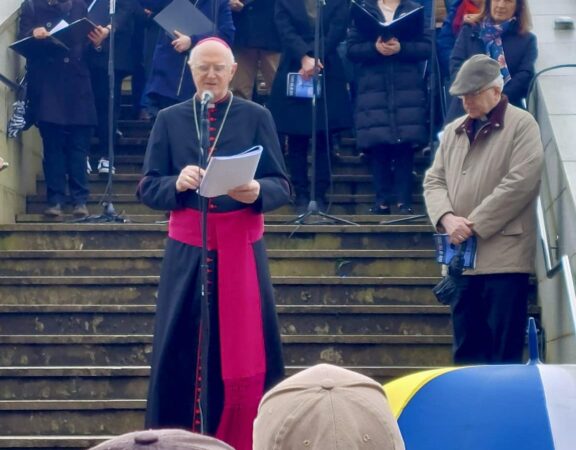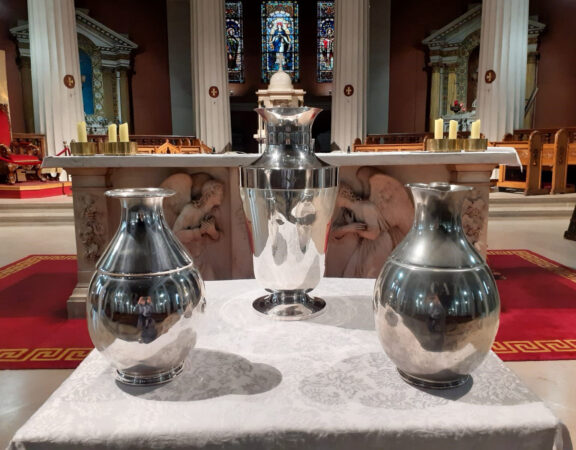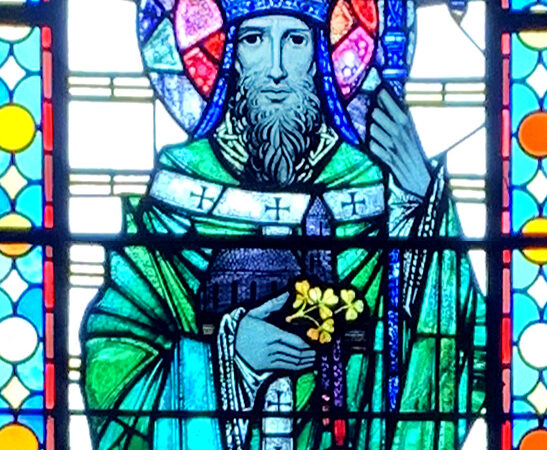Opening Mass
DUBLIN DIOCESAN PILGRIMAGE TO LOURDES 2019
Homily notes of
Most Rev. Diarmuid Martin
Archbishop of Dublin
—————————
Grotto of Massabielle, 5 September 2019
The crowds flock to Jesus. They know that there is a special power within him and if they come into contact with that power they can be healed of illness and released from the heavy bonds that hold people in anxiety.
It is this context that Jesus we are told “looks up at his disciples” and addresses to them what we know as the Beatitudes, a series of sayings that at times might seem paradoxes to us.
What is Jesus saying? Jesus looks at his disciples and illustrates to them how with his mission the standards of the world are being overturned. God’s values are different from the values and false values of the world. Jesus is saying that those who are poor, those thought to be outsiders, are the ones who are the truly blessed.
What does Jesus mean? In the first place, these words are promises and indications of what will occur when the plan of Jesus is fully realised.
However, what of the here and now? Is this teaching trying to deceive the poor? Is this a religion as Marx claimed that is the opium of the people? Would it not be more correct to urge the poor to revolution, rather than tell them that they are blessed and that they should be happy in their suffering?
The Beatitudes are, however, not just saying that true joy and the blessing will be fulfilled only at the end of time. These words are a challenge to all of us to begin to live today the new realities of the logic of Jesus. They are standards and signposts which indicate to all of us how we should be living as Christians and in some way anticipating in our times what the fullness of Jesus’ plan will bring. We are called every day, through the way we live, to bring something of the logic of Jesus into the harsh realities of our times.
The Beatitudes are not a canonization of poverty much less a canonization of the squalor and suffering to which human dignity is so often exposed through exclusion, exploitation and indifference. Each of us is called to bring the logic of Jesus into the world around us now. We do that here in Lourdes.
Lourdes is a place where the inequalities of our modern society are mitigated. The sick and the poor are our guests of honour. The main figures in the story of Lourdes belong to the poor. Mary was the one who gave herself completely so that she could be an instrument for allowing God’s will to break into human history.
Bernadette was humble and uneducated, yet she understood the call of Mary even if she did not understand some of the words that Mary used. It was the rich and the powerful who placed obstacles on the path of Bernadette. There is a sense in which the affluence and commercialism that surround Lourdes weakens the authenticity of its message. It is here in the quiet and prayerfulness of the Sanctuary and especially of this Grotto that we come in touch with the true message of Lourdes and that message touches and changes our hearts.
The Church and indeed society needs some who realise a special call to poverty and show that possessions, whether in talents or concern or physical wealth, are gifts to foster service. Think of the poverty of Saint Francis of Assisi. His life is a call to us to free ourselves of a love of those possessions that entrap us and make us unable to serve.
The poverty of Francis was a corrective to the Church in his time where the political system had led the Church to lack dynamism and missionary zeal. His poverty and rejection of wealth opened his heart to understand more deeply the call of Christ. Our love of the Church must be witnessed to with that same spirit of Saint Francis and indeed of Pope Francis who deliberately chose that name.
We gather here in prayer. We remember the intentions of our own hearts and the intentions of those who asked us to pray for them. Let us together remember the intentions of each other as we gather.
I thank those who come back year after year to support the sick and will be the first to remind us that they return home having gained more than they give. I thank the young people, especially those who are here for the first time. Learn how to place the tenderness that is in your hearts at the service of the sick and bring that experience with you as you prepare for your life and work. I thank the doctors and nurses and all those who attend the sick. I thank those who guarantee the smooth running of our pilgrimage and our accommodation.
I thank the priests who come with their pilgrims and lead us in prayer and the celebration of the sacraments. Pray for your priests and pray for vocations.
Each year pilgrims comment on the beautiful liturgies we celebrate. I thank Father Damian McNiece, his helpers and those who provide our music.
I thank our sick pilgrims. You inspire us with your faith. Our prayer is that in this holy place you will experience something of that spirit of the Beatitudes and realise how you have a special place in the heart of Jesus.
Our Gospel reading speaks of the crowds who come towards Jesus hoping for healing. It might be easy to overlook that the Gospel first of all says that they came to hear Jesus. Let us use these days to put aside the hectic and noise of our everyday and use this place of silence to let the word of God touch our hearts and renew our spirit.
May Mary and Bernadette accompany us in these days.









